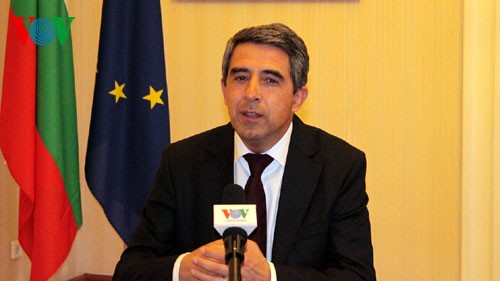(VOVworld)- Bulgaria’s President Rosen Plevneliev is on a 4-day state visit to Vietnam to further the 63-year-old bilateral relationship. The two countries are exerting efforts to develop a new model for bilateral cooperation amidst rapid global changes.
Bulgaria is located in Southeast of Europe. Despite the recent global financial turmoil, Bulgaria has made significant economic achievements. It succeeded in cutting its public debt-to-GDP ratio from 100% to 16% in 10 years, and kept its budget deficit and inflation within the limits set by the EU for the last three years. It was the only EU member country to have improved confidence ratings in the wake of the global recession. In regard to external policies, Bulgaria’s top priority is comprehensive integration into the European Union, striving to join the Schengen Agreement and the Eurozone. Bulgaria attaches importance to strengthening ties with Asian countries like Vietnam.

In an interview granted to VOV prior to his Vietnam visit, President Rosen Plevneliev revealed a new economic cooperation model with Vietnam
|
Political trust
Vietnam and Bulgaria have developed a traditional friendship and multifaceted cooperation for more than 60 years. Bulgaria was one of 10 countries that recognized and established diplomatic ties with Vietnam in 1950. Bulgaria provided valuable mortal and material support to Vietnam’s struggle for national liberation. In recent years, in its Asian policy, Bulgaria had been keen to boost relations with Vietnam. Vietnam has always treasured its traditional friendship and multi-faceted cooperation with its traditional friends in eastern and central Europe including Bulgaria. Vietnamese Ambassador to Bulgaria Le Duc Luu told VOV: “The two countries are conducting high-level political dialogues to strengthen cooperation, and share information within regional and international frameworks on issues of mutual concern. The two will continue to expand delegation exchanges and visits this year and in the years to come. Bulgaria and Vietnam hope to elevate their political relationship to a strategic partnership.”
Upgrade bilateral ties
To upgrade the bilateral ties, both sides are studying, identifying and building a more appropriate mechanism to enhance cooperation in various fields including trade and economics. Major achievements in economic cooperation have been recorded, with two-way trade totaling between 70 and 80 million USD a year. Bulgaria now has 7 FDI projects in Vietnam with total capital of 30 million USD. These include the Coffee Processing Project in Lam Dong, and the Garment and Textile Project in Hue. However, results have fallen short of potential and aspirations. A program to boost bilateral trade and economic cooperation is therefore needed, according to Ambassador Luu: “The two sides are hoping to develop a “New model of bilateral cooperation” by taking advantage of their strengths, exporting Vietnamese products to Bulgaria for processing and then exporting to the other European countries. This is a good, feasible and effective idea of cooperation which will tap both countries’ potential. To this end, the two sides need to fine-tuned their mechanism and policies, eliminate barriers of administrative procedures, and improve the effectiveness of trade and investment promotion programs. To take advantage of EU funding, the two sides need to develop joint projects, especially in agriculture, industry, and transportation to create a breakthrough in bilateral economic, trade and investment cooperation”.
Vietnam and Bulgaria are implementing a program on educational cooperation in the 2012-2016 period. Both identified heritage preservation and historical relic restoration as the focus of their cultural cooperation in the new period. More than 1,000 Vietnamese are currently residing in Bulgaria serving as a bridge linking the two countries.
Based on those achievements, President Plevneliev’s visit to Vietnam is expected to bring additional results. The visit will boost the traditional friendship and multi-faceted cooperation between the two countries, but also promote a new model of bilateral economic cooperation that will make the bilateral ties more practical and effective.